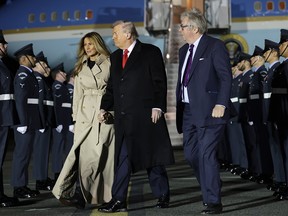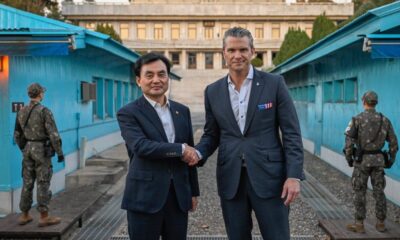Politics
Global Power Dynamics Shift as U.S. Leadership Faces Challenges

The recent military parade and the meeting of the Shanghai Cooperation Organization (SCO) in Beijing have highlighted a significant shift in global power dynamics. Observers note that the traditional influence of the Western alliance is diminishing, while the authoritarian bloc led by China, Russia, and North Korea is gaining traction. This development marks a pivotal moment in the evolution of international relations, as noted by Yaroslav Trofimov from the Wall Street Journal, who described the scene of China’s Xi Jinping alongside leaders from Russia and North Korea as indicative of a “new phase in the redrawing of the international order.”
The contrasting approaches of the United States under Donald Trump and the emerging solidarity among authoritarian states illustrate a growing divide. Former allies of the U.S., including India, Brazil, Vietnam, and South Africa, appear increasingly drawn to the stability and predictability offered by China, especially in light of Trump’s often abrasive rhetoric and policies. This shift has been described by political commentator Fareed Zakaria as “the greatest own goal in modern U.S. foreign policy.”
Western Alliances in Turmoil
Trump’s administration has employed aggressive tariff measures, which have strained relations with traditional NATO allies. Many countries have sought to appease the U.S. in hopes of maintaining vital economic ties. In the UK, the populist sentiments inspired by Trump have propelled Nigel Farage and his Reform UK party to a lead in recent polls, reflecting a growing discontent with the current government.
In France, political instability has reached new heights, with the recent fall of yet another centrist government. The emergence of the far-right National Rally, led by Marine Le Pen, has gained momentum as the political landscape becomes increasingly fragmented. Jordan Bardella, Le Pen’s designated successor, is actively working to reshape the party’s image, distancing it from its historical associations with antisemitism and extremist ideologies.
Meanwhile, in Germany, Chancellor Friedrich Merz faces an uphill battle against rising public unrest and growing support for the far-right Alternative for Germany party. The reluctance of European leaders to confront Trump on tariff issues has only added to public frustration, as they seek to rekindle reliance on Washington despite the potential for economic self-sufficiency.
Implications for Global Security
As European leaders grapple with the implications of U.S. foreign policy, there is a palpable fear regarding Russia’s actions in Ukraine. NATO’s unity is being tested as Trump calls for secondary sanctions against nations purchasing Russian oil and gas. However, many in Europe are beginning to question the effectiveness of U.S. strategies, particularly as Vladimir Putin continues to exploit the geopolitical landscape to his advantage.
Recent drone attacks attributed to Russia on Polish territory have raised alarms about NATO’s cohesion. Trump’s dismissive comment that these could have been a “mistake” was met with a firm rebuttal from Polish Prime Minister Donald Tusk, who insisted on the calculated nature of the attack. This exchange underscores the increasing urgency for European nations to prioritize their security interests independently of the U.S.
As the political landscape shifts, the need for a more coherent and unified European defense strategy becomes clear. Leaders are encouraged to break free from reliance on the U.S. and establish a cooperative security framework that can effectively counter threats from Russia.
The current state of U.S. foreign policy, characterized by impulsive decision-making and a transactional approach, has not only alienated potential allies but may also embolden adversaries. As the international community observes these developments, the question remains whether countries like Canada, which relies heavily on U.S. relations, can recalibrate their foreign policies to safeguard their national interests in an increasingly complex global environment.
In summary, the events unfolding in the international arena highlight the fragility of the current world order. As the dynamics shift, it is critical for nations to navigate this evolving landscape with strategic foresight and a commitment to collaboration.
-

 World4 months ago
World4 months agoScientists Unearth Ancient Antarctic Ice to Unlock Climate Secrets
-

 Entertainment4 months ago
Entertainment4 months agoTrump and McCormick to Announce $70 Billion Energy Investments
-

 Lifestyle4 months ago
Lifestyle4 months agoTransLink Launches Food Truck Program to Boost Revenue in Vancouver
-

 Science4 months ago
Science4 months agoFour Astronauts Return to Earth After International Space Station Mission
-

 Technology2 months ago
Technology2 months agoApple Notes Enhances Functionality with Markdown Support in macOS 26
-

 Top Stories3 weeks ago
Top Stories3 weeks agoUrgent Update: Fatal Crash on Highway 99 Claims Life of Pitt Meadows Man
-

 Sports4 months ago
Sports4 months agoSearch Underway for Missing Hunter Amid Hokkaido Bear Emergency
-

 Politics3 months ago
Politics3 months agoUkrainian Tennis Star Elina Svitolina Faces Death Threats Online
-

 Politics4 months ago
Politics4 months agoCarney Engages First Nations Leaders at Development Law Summit
-

 Technology4 months ago
Technology4 months agoFrosthaven Launches Early Access on July 31, 2025
-

 Top Stories1 week ago
Top Stories1 week agoFamily Remembers Beverley Rowbotham 25 Years After Murder
-

 Entertainment4 months ago
Entertainment4 months agoCalgary Theatre Troupe Revives Magic at Winnipeg Fringe Festival




















